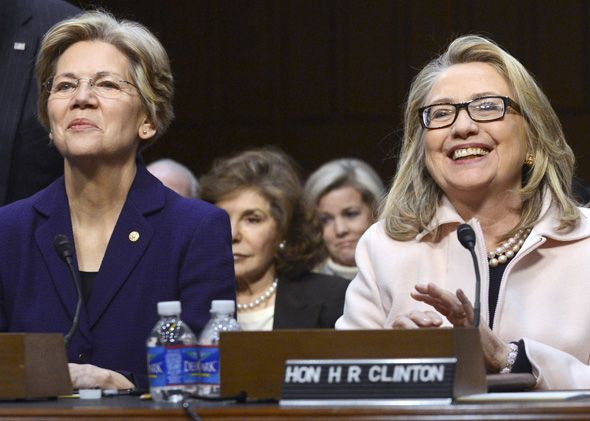Hillary Clinton vs. Elizabeth Warren: Big Differences, Despite Claims To The Contrary

Hillary Clinton’s political allies want liberal Democratic primary voters to believe that the former secretary of state is just like populist Massachusetts senator Elizabeth Warren, and they've been claiming that there are no differences between the two possible presidential contenders on any vote or political issue. There’s just one problem: That’s not quite true.
Clinton this week is filling in for George W. Bush, of all people, at an Ameriprise conference, continuing a speaking tour that is raking in big money from Wall Street. One of her aides later downplayed the idea that Clinton’s relationship with the financial sector could be a political liability for her, should she face Warren in the 2016 Democratic presidential primaries, reports the Hill.
“Ask any so-called 'left' or 'liberal' critic of Hillary to name a single vote or position on issue on which Elizabeth Warren and Hillary would disagree,” said the Clinton political strategist. “Rhetoric is not an acceptable answer.”
However, there isn’t just one single vote or position on which the two disagree: There appear to be many.
For example, in her 2003 book, Warren slammed Clinton for reversing her previous position as first lady by voting in 2001, as a New York senator, for a bankruptcy bill that ultimately passed in 2005. That legislation makes it more difficult for credit card customers to renegotiate their debts, even as it allows the wealthy to protect their second homes, yachts and investment properties from creditors. According to a 2009 study by the Federal Reserve Bank of New York, the bankruptcy bill’s provisions changing debt payback provisions played a central role in the foreclosure crisis, as the new law forced homeowners to pay off credit card debts before paying their mortgage.
"As first lady, Mrs. Clinton had been persuaded that the bill was bad for families, and she was willing to fight for her beliefs,” Warren wrote. “As New York’s newest senator, however, it seems that Hillary Clinton could not afford such a principled position. ... The bill was essentially the same, but Hillary Rodham Clinton was not.”
Additionally, Warren has been a vocal critic of so-called free trade deals, which create major regulatory protection for intellectual property, patents and copyrights, but often remove such protections for workers, consumers and the environment. Clinton, by contrast, was a key backer of NAFTA and voted for free trade pacts with Oman, Chile and Singapore during her Senate tenure. Additionally, Clinton was a key Obama administration player when the administration began pushing the Trans Pacific Partnership - a free trade deal that Warren has publicly criticized.
Clinton was a prominent supporter of the 1996 welfare reform legislation that made it more difficult for poor families to receive government benefits. She stood by that support during her 2008 presidential campaign. With a new study from the Center on Budget and Policy Priorities showing that law coincided with a rise in extreme childhood poverty, Clinton's position may open her up to criticism from Warren, who has positioned herself as a champion of the poor.
There is also Clinton’s vote for the Iraq War. During her 2012 Senate campaign, Warren was an outspoken critic of the war. As a senator, Warren is a co-sponsor of a new bill to repeal the original authorization for war in Iraq that Clinton supported.
In recent years, Clinton has attempted to distance herself from her previous positions. In 2008, she said, “I should not have voted for that bankruptcy law.” That year, she also said she believes the NAFTA free trade model needs to be “adjusted.” And in her 2014 book, "Hard Choices," Clinton says of her Iraq War vote: “I wasn’t alone in getting it wrong. But I still got it wrong. Plain and simple.”
While the reversals now position Clinton as closer to Warren on some issues than her previous record would suggest, that does not mean that they now agree on every issue. Additionally, as then-Sen. Barack Obama’s criticism of Clinton on these issues proved in 2008, Clinton's retrospective apologies and admissions do not necessarily wipe the record clean for Democratic voters with long memories.
That may be especially true with Clinton continuing to rake in hundreds of thousands of dollars from financial firms. If she does face Warren, the Senate’s most famous anti-Wall Street crusader - who has said she is not planning a 2016 candidacy though many activists are urging her to run - her record will likely once again be center stage in Democratic primary politics.
© Copyright IBTimes 2025. All rights reserved.






















